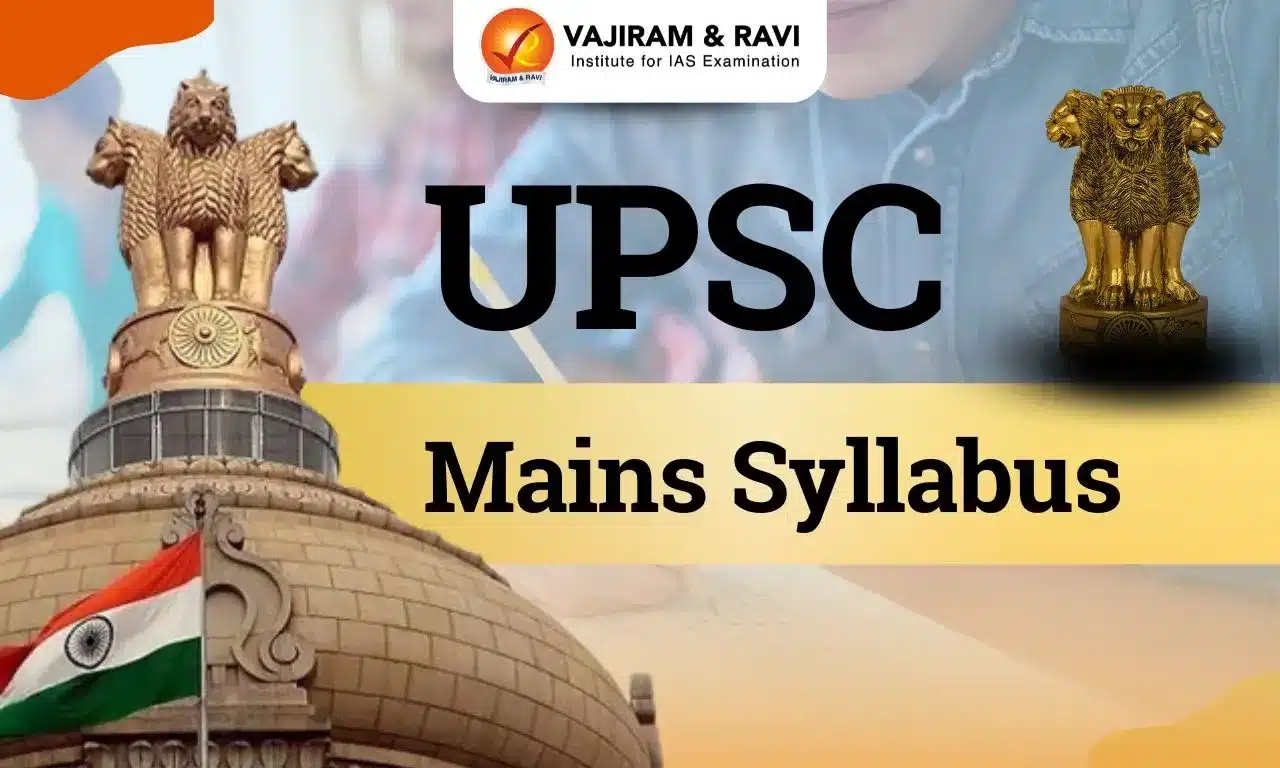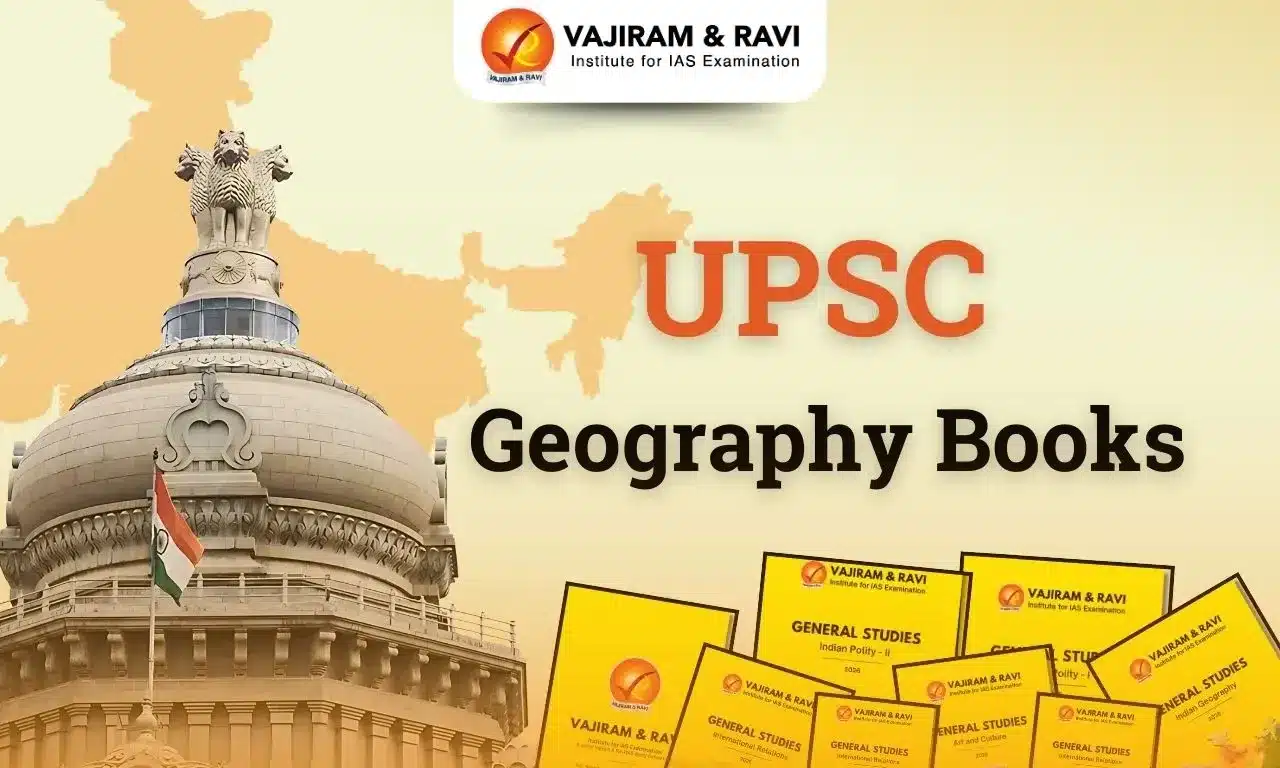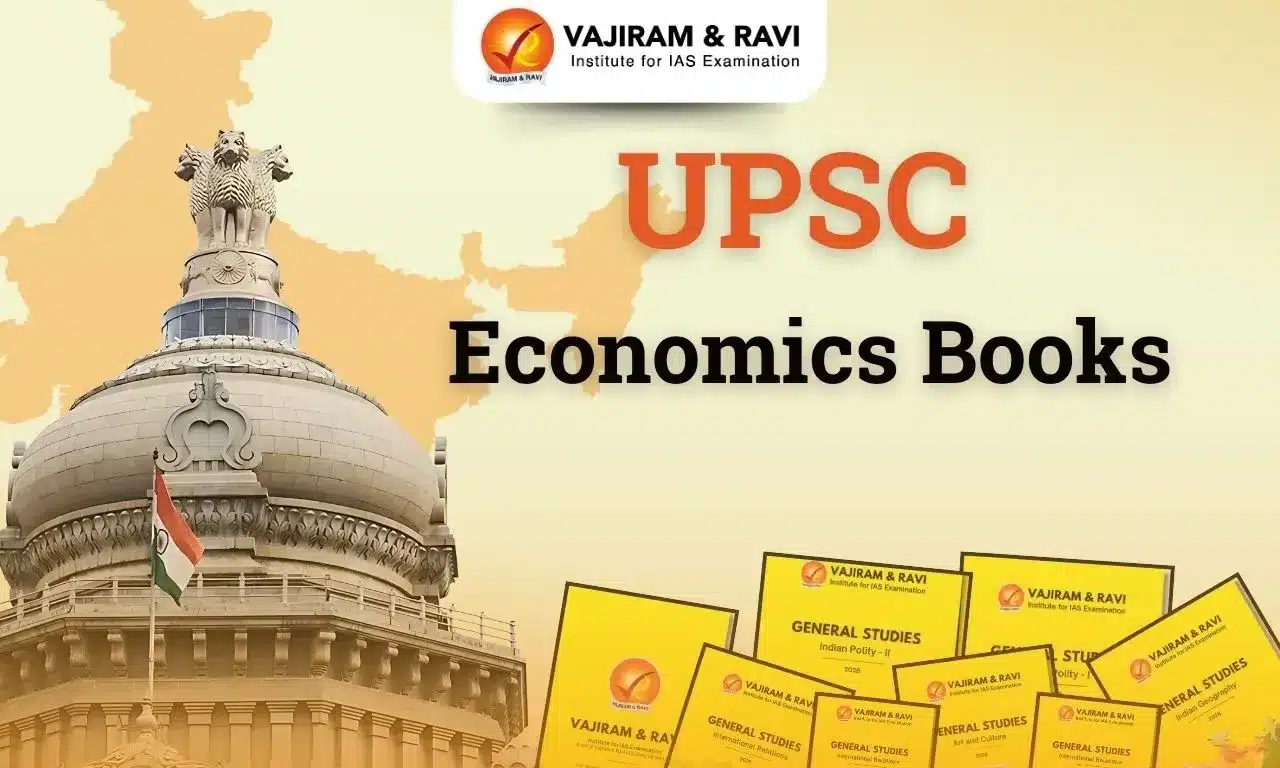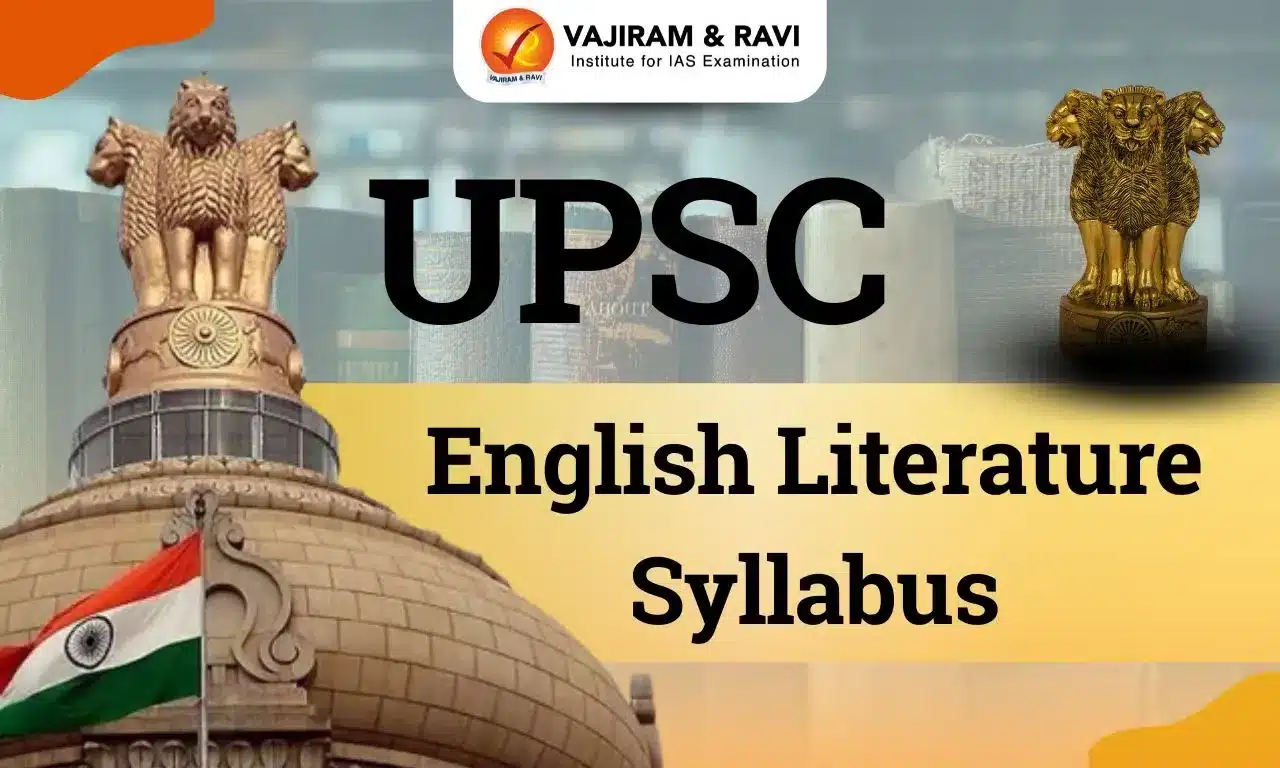The UPSC Mains Syllabus comprises nine theory papers, with marks from seven papers contributing to the final merit list. The other two papers, English and Indian Language, are qualifying, requiring candidates to achieve a minimum score of 25% to be considered for selection.
The UPSC Mains Syllabus is a comprehensive framework designed for candidates aiming to excel in the Civil Services Examination, one of India’s most prestigious and competitive exams. As the second phase of the UPSC CSE selection process, it covers a wide range of subjects and topics essential for success.
The syllabus for UPSC Mains 2026 is detailed below, and aspirants can also download the UPSC Mains Syllabus PDF
Also Read: UPSC Prelims Result 2025
UPSC Mains Syllabus 2026
The UPSC Mains syllabus is comprehensive and aims to evaluate a candidate's academic talent and ability to present knowledge in a clear and coherent manner.
The Mains examination consists of nine papers, which include:
| Paper | Subject | Duration | Total marks |
| Paper A | Compulsory Indian language | 3 hours | 300 (Qualifying) |
| Paper B | English | 3 hours | 300 (Qualifying) |
| Paper I | Essay | 3 hours | 250 |
| Paper II | General Studies I – Indian Heritage & Culture, History & Geography of the World & Society | 3 hours | 250 |
| Paper III | General Studies II – Governance, Constitution, Welfare Initiatives, Social Justice & International Relations | 3 hours | 250 |
| Paper IV | General Studies III – Technology, Economic Development, Agriculture, Biodiversity, Security & Disaster Management | 3 hours | 250 |
| Paper V | General Studies IV – Ethics, Integrity & Aptitude | 3 hours | 250 |
| Paper VI | Optional Subject – Paper I | 3 hours | 250 |
| Paper VII | Optional Subject – Paper II | 3 hours | 250 |
Each paper is designed to test specific aspects of a candidate’s knowledge and aptitude, encouraging a broad and diverse preparation strategy. A deep understanding of the syllabus and focused study on each area is crucial for success in the UPSC Mains Examination.
UPSC Mains Topic Wise Syllabus
The Mains syllabus encompasses diverse fields such as Indian Heritage and Culture, Governance, Technology, Economic Development, and Ethics, among others. Each paper and its topics are crafted to test different facets of a candidate's intellect, from factual knowledge and conceptual clarity to critical thinking and ethical reasoning.
This detailed, topic-wise breakdown is essential for aspirants to strategize their preparation, enabling them to cover every aspect of the syllabus comprehensively.
UPSC Mains Syllabus Language Papers
UPSC Mains Language papers- Paper A and Paper B are only qualifying in nature, candidates should not be complacent. Failing to score at least 25% in either paper will result in their remaining answer sheets not being evaluated.
Paper A: Indian Language (Qualifying)
Candidates can choose any one of the Indian languages included in the Eighth Schedule of the Indian Constitution. The paper is designed to test the candidates’ ability to read and understand serious discursive prose, and to express their ideas clearly and correctly.
| Languages mentioned in the Eighth Schedule | |
| Assamese | Odia |
| Bengali | Punjabi |
| Gujarati | Sanskrit |
| Hindi | Sindhi |
| Kannada | Tamil |
| Kashmiri | Telugu |
| Konkani | Urdu |
| Malayalam | Bodo |
| Manipuri | Dogri |
| Marathi | Maithili |
| Nepali | Santhali |
Paper B: English (Qualifying)
The English paper aims to test the candidates’ ability to read and understand serious discursive prose, and to express their ideas clearly and correctly in English.
UPSC Mains Syllabus- Essay Papers
The Essay Paper in the UPSC Mains examination is designed to evaluate a candidate’s ability to express ideas clearly, coherently, and effectively. It is crucial for demonstrating the ability to organize thoughts and present them in a structured manner. Candidates are required to write two essays, selecting one topic from each section.
- Candidates will be provided with a set of topics divided into two sections. They must choose one topic from each section and write two essays in total.
- Topics may cover a wide range of subjects, including current events, philosophical themes, socio-economic issues, political scenarios, and environmental concerns.
UPSC Mains Syllabus General Studies Paper 1
UPSC Mains General Studies Paper 1 delves into a wide array of subjects, including Indian Heritage and Culture, History, and Geography of the World and Society. This paper aims to evaluate a candidate’s understanding of historical contexts, cultural developments, and geographical knowledge essential for comprehensive civil services preparation.UPSC Mains GS Paper 1 includes-
- Indian Culture – Salient aspects of Art Forms, Literature and Architecture from ancient to modern times.
- Modern Indian History
- Significant events, issues, personalities during the middle of the eighteenth century (1750s) until the present.
- Different stages and important contributors and contributions from various parts of the country in ‘The Freedom Struggle’.
- Post-independence consolidation and reorganisation within the country.
- History of the world
- Events, forms and effect on society since the 18th century (world wars, industrial revolution, colonisation, redrawal of national boundaries, decolonisation, political philosophies like communism, capitalism, socialism, etc.)
- Society
- Indian society and diversity – Salient aspects.
- Role of women and women’s organisations, population and associated issues, poverty and developmental issues, urbanisation, their problems and remedies.
- Social empowerment, communalism, regionalism & secularism.
- Effects of globalization on Indian society.
- Geography
- Distribution of key natural resources across the world including South Asia and the Indian sub-continent; factors responsible for the location of primary, secondary, and tertiary sector industries in various parts of the world including India.
- Important Geophysical phenomena such as earthquakes, Tsunami, Volcanic activity, cyclones etc.
- Geographical features and their location, changes in critical geographical features (including water-bodies and polar ice caps) and, in flora and fauna and the effects of such changes.
- Salient features of the world's physical geography.
UPSC Mains Syllabus General Studies Paper 2
UPSC Mains General Studies Paper 2 focuses on Governance, Constitution, Polity, Social Justice, and International Relations. This paper assesses a candidate's knowledge of the political and administrative framework of India, as well as their understanding of critical issues affecting governance and international affairs. UPSC Mains GS Paper 2 includes-
- Indian Constitution
- historical underpinnings,
- evolution, features
- amendments, significant provisions
- basic structure doctrine
- Comparison of the Indian constitutional scheme with that of other countries
- Functions and responsibilities of the Union and the States, issues and challenges pertaining to the federal structure, devolution of powers and finances up to local levels and challenges therein.
- Separation of powers between various organs, dispute redressal mechanisms and institutions
- Structure, organisation and functioning of the Executive and the Judiciary
- Parliament and State Legislatures
- structure, functioning
- conduct of business
- powers & privileges and issues arising out of these
- Ministries and Departments of the Government; pressure groups and formal/informal associations and their role in the Polity.
- Salient features of the Representation of People’s Act
- Appointment to various Constitutional posts, powers, functions and responsibilities of various Constitutional Bodies.
- Statutory, regulatory and various quasi-judicial bodies.
- Government policies and interventions aimed at development in various sectors and issues arising out of their design and implementation.
- Development processes and the development industry – the role of NGOs, Self Help Groups, various groups and associations, institutional and other stakeholders.
- Welfare schemes for vulnerable sections of the population by the Centre and the States and the performance of these schemes; mechanisms, laws, institutions and Bodies constituted for the protection and betterment of these vulnerable sections.
- Issues relating to development and management of Social Sector/Services relating to Health, Education, Human Resources
- Issues relating to poverty and hunger
- Important aspects of governance, transparency and accountability, e-governance- applications, models, successes, limitations, and potential; citizens charters, transparency & accountability and institutional and other measures
- Role of civil services in a democracy
- International Relations
- India and its neighborhood – International relations
- Bilateral, regional and global groupings and agreements involving India and/or affecting the Indian interests
- Effect of policies and politics of developed and developing countries on India’s interests, Indian diaspora.
- Important International institutions, agencies, their structure and mandates
UPSC Mains Syllabus General Studies Paper 3
UPSC Mains General Studies Paper 3 covers Technology, Economic Development, Biodiversity, Environment, Security, and Disaster Management. This paper evaluates a candidate's understanding of contemporary issues related to economic growth, technological advancements, environmental challenges, and security concerns, emphasizing practical knowledge and problem-solving skills. UPSC Mains GS Paper 3 includes-
- Economy
- Indian Economy and issues relating to planning, mobilisation of resources, growth, development and employment.
- Government Budgeting.
- Inclusive growth and associated issues/challenges
- Effects of liberalisation on the economy (post 1991 changes), changes in industrial policy and their effects on industrial growth.
- Infrastructure – Energy, Ports, Roads, Airports, Railways etc.
- Investment models (PPP etc)
- Agriculture
- Major cropping patterns in various parts of the country, different types of irrigation and irrigation systems storage, transport and marketing of agricultural produce and issues and related constraints; e-technology in the aid of farmers
- Economics of animal rearing.
- Food processing and related industries in India – scope and significance, location, upstream and downstream requirements, supply chain management.
- Issues related to direct and indirect farm subsidies and minimum support prices; Public Distribution System objectives, functioning, limitations, revamping; issues of buffer stocks and food security; Technology missions
- Land reforms in India.
- Science and Technology
- Recent developments and their applications and effects in everyday life
- Achievements of Indians in science & technology.
- Indigenisation of technology and developing new technology.
- General awareness in the fields of IT, Space, Computers, Robotics, Nanotechnology, bio-technology
- Issues relating to intellectual property rights
- Environment
- Conservation,
- Environmental pollution and degradation
- Environmental impact assessment
- Disaster Management (Laws, Acts etc.)
- Security
- Challenges to internal security (external state and non-state actors)
- Linkages between development and spread of extremism
- Challenges to internal security through communication networks, role of media and social networking sites in internal security challenges,
- Basics of cyber security; money-laundering and its prevention
- Security challenges and their management in border areas; linkages of organized crime with terrorism
- Various Security forces and agencies and their mandates
UPSC Mains Syllabus General Studies Paper 4
UPSC Mains General Studies Paper 4 focuses on Ethics, Integrity, and Aptitude. This paper assesses a candidate's ability to apply ethical principles to public administration, evaluate moral dilemmas, and demonstrate integrity and effective decision-making in complex scenarios, essential for responsible and ethical governance. UPSC Mains GS Paper 4 includes
- Ethics and Human Interface
- Essence of Ethics, Determinants and Consequences of Ethics in Human Interaction
- Dimensions of Ethics
- Ethics in private and public relationships
- Human Values – lessons from the lives and teachings of great leaders, reformers and administrators
- Role of family, society and educational institutions in inculcating moral and ethical values
- Attitude
- Content, structure and function of attitude
- Influence of attitude in thought and behaviour
- Relation of attitude to thought and behaviour
- Moral and Political attitudes
- Social influence and persuasion
- Aptitude
- Aptitude and foundational values of Civil Service
- Integrity
- Impartiality and non-partisanship
- Objectivity
- Dedication to public service
- Empathy, tolerance and compassion towards the weaker sections of the society
- Emotional Intelligence
- Concepts of emotional intelligence
- Utility and application of emotional intelligence in administration and governance
- Contributions of Thinkers and Philosophers
- Contributions of moral thinkers and philosophers from India and the world to the concepts of morality
- Public/Civil Service Values and Ethics in Public Administration
- Status and associated problems
- Ethical concerns and dilemmas in government and private institutions
- Laws, rules, regulations and conscience as sources of ethical guidance
- Accountability and ethical governance
- Strengthening of ethical and moral values in governance
- Ethical Issues in international relations and funding
- Corporate governance
- Probity in Governance
- Concept of public service
- The philosophical basis of governance and probity
- Information sharing and transparency in government
- Right to Information
- Codes of ethics
- Codes of Conduct
- Citizen’s Charters
- Work culture
- Quality of service delivery
- Utilization of public funds
- Challenges of corruption
UPSC Mains Syllabus Optional Papers
Candidates must select one optional subject from a list of 48 options, with two papers contributing a total of 500 marks. Choosing the right optional subject for the UPSC Mains is a crucial decision that requires careful consideration.
Last updated on November, 2025
→ Check out the latest UPSC Syllabus 2026 here.
→ Join Vajiram & Ravi’s Interview Guidance Programme for expert help to crack your final UPSC stage.
→ UPSC Mains Result 2025 is now out.
→ UPSC Notification 2026 is scheduled to be released on January 14, 2026.
→ UPSC Calendar 2026 is released on 15th May, 2025.
→ The UPSC Vacancy 2025 were released 1129, out of which 979 were for UPSC CSE and remaining 150 are for UPSC IFoS.
→ UPSC Prelims 2026 will be conducted on 24th May, 2026 & UPSC Mains 2026 will be conducted on 21st August 2026.
→ The UPSC Selection Process is of 3 stages-Prelims, Mains and Interview.
→ UPSC Result 2024 is released with latest UPSC Marksheet 2024. Check Now!
→ UPSC Prelims Result 2025 is out now for the CSE held on 25 May 2025.
→ UPSC Toppers List 2024 is released now. Shakti Dubey is UPSC AIR 1 2024 Topper.
→ UPSC Prelims Question Paper 2025 and Unofficial Prelims Answer Key 2025 are available now.
→ UPSC Mains Question Paper 2025 is out for Essay, GS 1, 2, 3 & GS 4.
→ UPSC Mains Indian Language Question Paper 2025 is now out.
→ UPSC Mains Optional Question Paper 2025 is now out.
→ Also check Best IAS Coaching in Delhi
UPSC Mains Syllabus 2026 FAQs
Q1. What is the UPSC mains syllabus?+
Q2. What are the 9 papers in UPSC Mains?+
Q3. Is 7 months enough for UPSC mains?.+
Q4. What is the syllabus of UPSC Mains exam 2026?+
Q5. Can I clear mains in 3 months UPSC?+

















